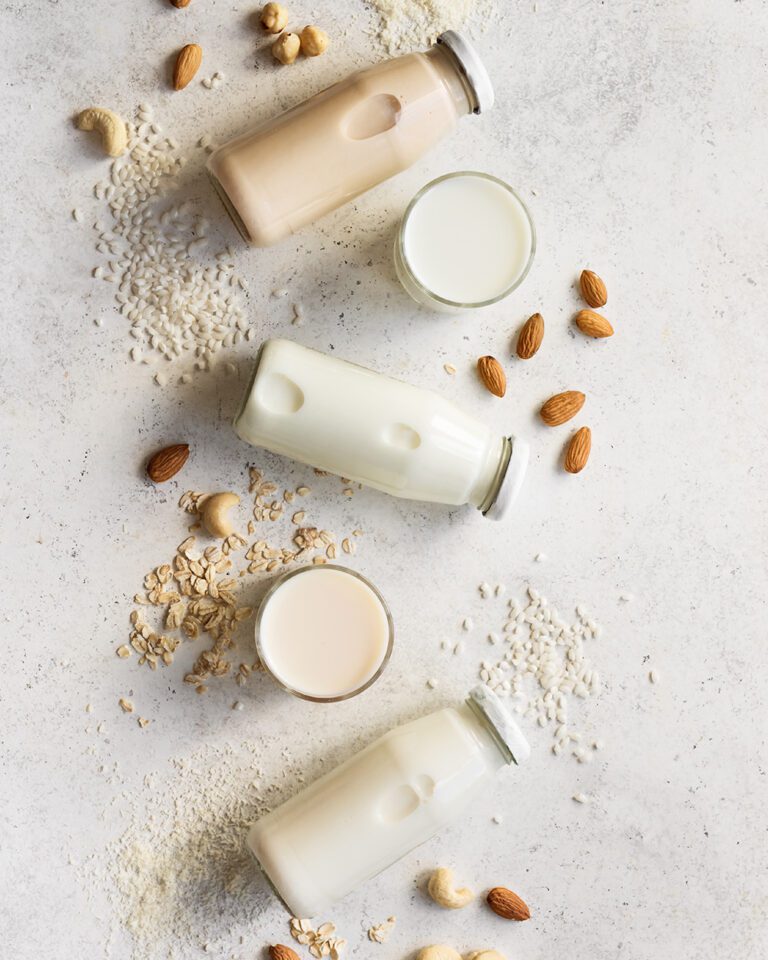Are plant milks really the healthy option?
In the UK we spend more on non-dairy milks than any other European country, and our supermarket shelves are awash with them. But is this trend impacting our health? Sue Quinn looks into an opaque issue…

What kind of milk do you order with your coffee? There’s a good chance it’s non-dairy as nearly one third of Brits favour plant-based milks. Some of us have no choice, of course. The British Nutrition Foundation estimates 5% of people in the UK are dairy intolerant, which means they can’t digest lactose, a sugar found in milk. A further small number are allergic to dairy. Some people avoid cow’s milk because of the taste or out of concern for the environment and/or animal welfare. Large numbers, though, choose plant milk because they think it’s healthier or because it’s what everyone else is doing.
What are plant-based milks?
They are mostly water, with the plant ingredient making up as little as 2% (and usually only up to 10%) of the volume, says registered nutritionist Charlotte Radcliffe. They’re classified as Ultra-Processed Foods (UPF), which are now linked to negative health effects if consumed in large quantities over time – and many contain lots of additives.
“Stabilisers are often used to help thicken the liquid and help with texture,” Radcliffe says. “Emulsifiers help with shelf life and product consistency, while flavourings are often added to intensify the flavour of the raw material.”
Some manufacturers add sugar to sweeten and/or mask the flavour of the plant ingredient. Certain plant milks, notably oat and rice, contain sugar that gets released when the starchy plant ingredient is broken down during processing. In both cases, these are ‘free sugars’ – the kind we’re advised to limit because they can damage our health when consumed in large quantities.
The nutrient deficit
A recent rise in cases of nutrient deficiency in the UK has been blamed, in part, on the growing popularity of plant-based food and drink. Registered nutritionist Dr Laura Wyness says it’s difficult to know for certain the extent to which that’s true, if at all. The nutrients in different types and brands of plant milks vary widely, she explains. “And if you eat a variety of foods, you should be able to get all the key nutrients you need. But one nutrient of concern with the shift to plant milk alternatives is consuming adequate intakes of iodine.”
White fish and shellfish provide useful sources of iodine, and cow’s milk is the major one in the UK, where iodine is added to cattle feed. Deficiency can result in a slower metabolism, causing weight gain, fatigue, dry skin and hair, and difficulty concentrating. Consuming enough is particularly important during pregnancy to support the baby’s brain development.

“Currently, only 20% of plant milk alternatives are fortified with iodine – and even if they are, most still have iodine levels lower than cow’s milk,” Dr Wyness says. “A recent study reported that replacing cow’s milk with an unfortified/organic plant milk alternative would increase the risk of iodine insufficiency in adults. Iodine deficiency, especially in women, has been identified as a concern in the UK in recent years.”
Cow’s milk is the major source of iodine in the UK. Deficiency can result in a slower metabolism, fatigue, dry skin and hair, and difficulty concentrating
Why cow’s milk is so good for you
If you can tolerate cow’s milk, it has many benefits:
Calcium
A 250ml glass of whole cow’s milk contains around 40% of the 700mg calcium it’s recommended we consume daily. “Calcium is important for healthy bones and teeth,” says Radcliffe.
Many plant milks are fortified with calcium, but some studies suggest it’s more readily absorbed from cow’s milk. “It’s not clear if the seemingly small difference in absorption is significant in terms of the nutrition gained from drinking fortified milk alternatives,” Dr Wyness says.
If you don’t drink cow’s milk, Radcliffe advises eating calcium-rich foods. These include dried figs and apricots, pulses, leafy greens, calcium-set tofu, bread, pulses and nuts, as well as fish (such as sardines) whose bones you eat.
Protein
Cow’s milk is a rich source of two types of protein: casein and whey. Whey includes a type of amino acid (a building block of protein) that’s especially good for muscle repair and reducing post-workout soreness.
A 250ml glass of whole milk contains 8.5g protein, which is a good chunk of the daily recommended intake of 56g a day for men and 45g per day for women. “Most plant milk alternatives, with the exception of soya, have almost no protein,” Dr Wyness adds.
Vitamin B12
Vital for a healthy metabolism, B12 is abundant in cow’s milk. One 250ml glass provides around one third of the recommended daily intake. Since B12 is found only in animal products, it’s important to take supplements or consume B12 fortified food and drink if you consume only plant-based foods, Radcliffe says.
Vitamin B2
Riboflavin, or vitamin B2 as it’s also known, supports healthy skin, eyes and nervous system, and helps the body release energy from food. A 250ml glass of whole milk contains more than one third of your daily requirement, and many plant milks are fortified with vitamin B2.

Are there any downsides to dairy?
In general, cow’s milk isn’t a good source of vitamin D, but the vitamin is added to many plant milks.
The rich texture and flavour of whole cow’s milk is mostly due to the fat content, and many people are concerned about this. Should they be?
Dr Wyness points out that whole cow’s milk isn’t high in fat, contrary to popular belief. In fact, with only 3.7% fat, it nearly falls into the low-fat food category (less than 3%). That means opting for reduced fat milk won’t make much difference if you’re only splashing a little in hot drinks. But if you have high cholesterol and need to reduce your saturated fat intake, opting for reduced fat milk is advised. “Semi-skimmed milk contains around half the saturated fat of whole milk and skimmed milk has just a trace,” she says.
Reduced fat milks and whole milk contain similar levels of B-vitamins, calcium, potassium and iodine. However, whole milk contains more vitamin A.
The bottom line
Some evidence suggests that opting for plant milks over dairy can increase your risk of nutrient deficiencies, particularly iodine. However, it’s possible to get almost all the nutrients you need (except vitamin D, for which everyone in the UK is advised to take a supplement in the winter months) by eating a wide variety of foods.
If you drink only plant milks, pick those fortified with calcium, iodine, and vitamins D and B12 to reduce the risk of deficiencies. But bear in mind that some studies suggest fortified plant milks contain lower levels of these nutrients than cow’s milk.
Nutritionist Charlotte Radcliffe compares plant milks
Soya
A great cow’s milk substitute, and the most nutritionally similar in terms of protein. It’s also low in saturated fats and a source of healthy unsaturated fats.
Oat
Low in protein and often higher in calories than other plant milks. It often contains more free sugars, regardless of whether additional sugar has been added. It’s a good choice for those with nut or soya allergies.
Almond
Typically low in calories and saturated fats, but also low in protein. So, despite being popular, it’s not the best choice nutritionally as a direct swap for cow’s milk.
Rice
Low in saturated fats, but also very low in protein and often higher in calories than other plant milks. It’s often high in free sugars, too, and not recommended for children under five due to its arsenic content. (Arsenic is naturally present in our environment and can inadvertently be absorbed by crops – and rice can absorb more than other cereal crops. As young children have low body weights and tend to drink more milk, this option is best avoided, according to the NHS.)
Discover more food-focused health reads, from what to eat for better sleep to the pros and cons of breakfast.
Subscribe to our magazine
Food stories, skills and tested recipes, straight to your door... Enjoy 5 issues for just £5 with our special introductory offer.
Subscribe
Unleash your inner chef
Looking for inspiration? Receive the latest recipes with our newsletter